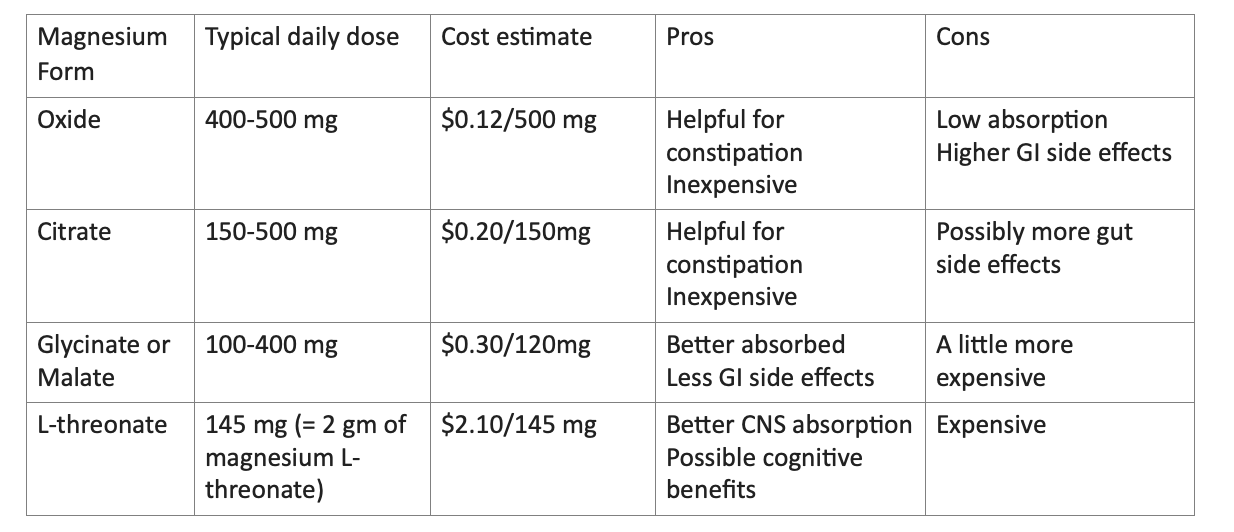I have suffered from migraines for more than half my life and have tried a wide range of potential remedies, looking for a miracle cure. One of the things I stumbled onto during my pre-functional medicine days was magnesium. Spoiler alert — magnesium was not the magical cure-all I had hoped for back then. In fairness, in those days, I was the opposite of functional; I was a stress-out, sleep-medication-dependent-insomniac eating lots of processed foods. YET, I was expecting a little mineral to be a big miracle — quite an unrealistic expectation.
That said, along my functional journey and addressing my dysfunctions, magnesium has been and remains a core piece of my health regimen. This is because while we need to manage all aspects of health, many nutrients, including magnesium, play fundamental roles in our cellular operations, and deficiencies can create untold issues. Magnesium is a relatively inexpensive and low-risk intervention for those with normal kidney function, but one that can serve as an easy win towards achieving and maintaining wellness.
So how do you know if you need magnesium and if you should take a magnesium supplement? With so many magnesium supplements on the market promising to have better absorption, promote better sleep, make you smarter, etc, how do you know which one is right for you? It can be quite overwhelming — especially to anyone who is like me and is a sucker for anything that claims to be superior!
If you want to learn more (and I apologize, this is a longer blog), let’s dive in!
Magnesium is one of the most abundant minerals in the human body and is necessary for the function of more than 300 enzymes (1). Let me say that again — 300 enzymes!! These functions include some of the most fundamental operations in our cells, including:
- Energy production
- Synthesis of DNA and RNA
- Transport of calcium and potassium across the cell membranes
Magnesium is also essential for:
- Nerve signal transmission
- Vitamin D synthesis
- Structural development of bone
Given the wide range of what magnesium does in the human body, you can imagine magnesium deficiencies can have huge implications on health. In fact, magnesium deficiency has been linked with many chronic health conditions, including cardiovascular disease, type 2 diabetes, osteoporosis, migraines, cognitive disorders, and even cancer (2–6).
Interestingly, it is estimated that as much as 48% of Americans may not be getting enough magnesium from their diet (7). Maybe that’s why we have so many chronic health issues.
So, how do you know if you have enough magnesium or not?
Unfortunately, we do not have a good test that measures our total body stores of magnesium. Most of our magnesium is bound up in our bones (50–60%) or soft tissues (40–49%). Only 1% is free and measurable in the serum (blood), the most common test used to measure magnesium (1).
Serum levels are excellent if you are really deficient in magnesium, a condition called hypomagnesemia. Hypomagnesemia is diagnosed when the serum magnesium is less than 1.6 mg/dl, and this can be present in states of various acute illnesses, chronic alcoholism, chronic malnutrition or malabsorption, chronic diarrhea, or the use of medications known to deplete magnesium, such as diuretics or proton pump inhibitors (PPIs). In these cases, there may be symptoms of muscle weakness, muscle cramps, or nervous system disorders with tremors or muscle spasms.
Serum magnesium is also great to evaluate if you have hypermagnesemia or too much magnesium. Hypermagnesemia is defined as having a serum magnesium level greater than 2.3 mg/dl, and it would be something to be concerned about in persons who are either taking large doses of magnesium or who have kidney dysfunction, for whom the risk of magnesium toxicity increases with the degree of kidney failure. Symptoms here include nausea, vomiting, neurologic changes, abnormally low blood pressure, and headaches.
As serum levels only reflect 1% of our total body stores, you can still have magnesium deficiency with a normal serum level. A better (albeit much more cumbersome) method to estimate your body’s magnesium stores is to measure the amount of magnesium excreted by the kidneys over 24 hours. (In plain speak, that means collecting ALL of your urine for a full 24 hours and then trotting it off to the lab in your car ).
The kidneys play a key role in the body’s magnesium balance. The kidneys initially filter out the magnesium from the blood and then reabsorb 95% of it back into the body. The amount that gets reabsorbed is variable and dependent on the total magnesium level in the body. If you are depleted of magnesium, more gets reabsorbed and less excreted in the urine; conversely, if you have adequate or excessive amounts of magnesium, less is reabsorbed, and more is excreted. It’s quite an elegant system!
In lieu of risking the potential of foul spillage in your car, we generally infer and treat magnesium deficiency based on symptoms or chronic conditions. Quite frankly, if you have any chronic health condition and have normal kidney function, I recommend magnesium fortification — either through food or supplementation.
So, how much magnesium do we need?
We are constantly losing magnesium in our urine and stool. We must, therefore, replenish our magnesium stores daily. For healthy adults with normal kidney function, the recommended dietary allowance (RDA) for magnesium is as follows:

How can we get our necessary magnesium?
We can get the necessary amounts of magnesium from our food or supplements.
Foods:
Foods that are high in magnesium include pumpkin and chia seeds, as well as nuts, spinach, and beans. As our soil becomes over-farmed and depleted of nutrients, there is a concern that the amount of magnesium in our food may not be as high as we estimate. However, foods are still a great way to optimize not just your magnesium intake, but also your intake of fiber and other nutrients, which will keep us healthy in the long run. I recommend aiming for the following:
- 4–6 servings of vegetables every day. The more the merrier! 1 serving equals 1 cup of raw vegetables and ½ cup of cooked vegetables.
- 1 ounce or ¼ cup of nuts or seeds daily.
- ½ cup cooked legumes (beans) most days of the week

Magnesium supplements:
Supplements come in many forms. Although studies have been mixed, magnesium oxide appears to have the lowest absorption compared to the other forms of magnesium (citrate, glycinate, malate, L-threonate) (9–14).
- Magnesium oxide or citrate are inexpensive options, especially good if you suffer from constipation. The absorption of magnesium oxide does not appear as good as some other forms, but it can still help replenish magnesium stores.
- Magnesium glycinate or malate are better-absorbed forms of magnesium and have fewer GI side effects. However, the price point starts to go up with these versions.
- Magnesium L-threonate is an interesting one. L-threonate form has been shown to get much higher CNS (brain) penetration than other forms of magnesium. A few studies have demonstrated this ability to achieve higher CNS levels can help with cognition, although more studies are needed (15–16). The price point for the recommended dose of 2000 mg magnesium L-threonate (which provides 145 mg of elemental magnesium) is significantly higher.
You want to take around the typical daily dose, although your provider may recommend more or less. I take 400 mg of magnesium glycinate with the occasional magnesium L-threonate.

How do we decide between food and supplements?
I encourage everyone to get as much of the necessary nutrients from healthy foods — again, these foods have many benefits beyond magnesium. Understandably, though, eating well is not always feasible, and even if you are eating all the right things, sometimes your body doesn’t absorb magnesium the way you want it to.
Magnesium absorption is quite complex and is affected by many factors: how healthy the intestine lining is, how much magnesium is ingested, what foods are taken with the magnesium, and what form the magnesium is in (14). This process is quite complex and too much to get into for this blog, but in general:
- Only approximately 30–40% of the magnesium is absorbed from foods. The content of fat, protein, and fiber influences absorption.
- Absorption declines with age.
- Intestinal dysfunction (such as inflammatory bowel disease and celiac disease) will decrease absorption.
- Your total magnesium stores will influence absorption.
Given absorption issues, life issues, or if you know that you are woefully under the RDA for magnesium, supplementation is not a bad idea. However, as I have stated before, magnesium is not a cure-all for health; if you want health, you must tackle all aspects of your lifestyle.
Who would benefit from magnesium supplementation?
In general, if you have normal kidney function and any chronic health condition, I would venture to say that supplementation might be a good option to try. In addition, I would strongly consider supplementation in the following groups:
- Older individuals
- Have a condition that can cause magnesium depletion: chronic alcohol use, chronic diarrhea, intestinal issues, use of medications like a diuretic or a PPI.
- Have frequent premature heartbeats (called PVCs) or other cardiovascular issues.
- Have issues with muscle cramping.
- Have migraines or headaches.
Can you overdose on magnesium?
Too much magnesium from food and oral supplements does not pose a health risk in healthy patients with normal kidney function — recall the elegant system in the kidneys; the excess magnesium will be excreted. However, getting too much supplemental magnesium can cause issues with nausea, diarrhea, and cramping, especially with magnesium oxide. Also, very large doses (>5g/d) of magnesium-containing laxatives and antacids have been associated with magnesium toxicity, even with normal renal function. Symptoms may include nausea, vomiting, headaches, lethargy, or arrhythmia.
How should you take magnesium?
Magnesium can be taken at any time of day, with or without food. You can consider splitting your magnesium doses to maximize absorption and take it at bedtime, as it may help with relaxation.
You do not want to take magnesium with calcium, as the two compete for absorption. Also, high doses of zinc can interfere with absorption.
If you take certain medications, you will want to discuss how to take magnesium with your doctor or pharmacist. But generally, a good rule of thumb is that medications should be taken at least 2 hours away from magnesium.
Take-home point:
- Magnesium is not a cure-all. However, it is a low-risk intervention with potentially significant gains, especially if you are magnesium-depleted for any reason and have normal kidney function. Talk with your healthcare provider if you find that this is something you want to try.
References
- Jahnen-Dechent W, Ketteler M. Magnesium basics. Clin Kidney J. 2012 Feb;5(Suppl 1):i3-i14. doi: 10.1093/ndtplus/sfr163. PMID: 26069819; PMCID: PMC4455825.
- de Baaij JH, Hoenderop JG, Bindels RJ. Magnesium in man: implications for health and disease. Physiol Rev. 2015 Jan;95(1):1–46. doi: 10.1152/physrev.00012.2014. PMID: 25540137.
- Romani AMP. Magnesium in health and disease. In: Sigel A, Sigel H, Sigel RKO, eds. Interrelations between essential metal ions and human disease. Dordrecht, The Netherlands: Springer; 2013. p. 49–79.
- Zhang X, Xia J, Del Gobbo LC, Hruby A, Dai Q, Song Y. Serum magnesium concentrations and all-cause, cardiovascular, and cancer mortality among U.S. adults: Results from the NHANES I Epidemiologic Follow-up Study. Clin Nutr. 2018 Oct;37(5):1541–1549. doi: 10.1016/j.clnu.2017.08.021. Epub 2017 Aug 30. PMID: 28890274.
- Wu Z, Ruan Z, Liang G, Wang X, Wu J, Wang B. Association between dietary magnesium intake and peripheral arterial disease: Results from NHANES 1999–2004. PLoS One. 2023 Aug 11;18(8):e0289973. doi: 10.1371/journal.pone.0289973. PMID: 37566622; PMCID: PMC10420347.
- Domitrz I, Cegielska J. Magnesium as an Important Factor in the Pathogenesis and Treatment of Migraine-From Theory to Practice. Nutrients. 2022 Mar 5;14(5):1089. doi: 10.3390/nu14051089. PMID: 35268064; PMCID: PMC8912646.
- US Department of Agriculture and US Department of Health and Human Services. Report of the Dietary Guidelines Advisory Committee on the dietary guidelines for Americans. Washington (DC): USDA Agricultural Research Service; 2015.
- National Institutes of Health Office of Dietary Supplements. Magnesium fact sheet for health professionals; 2013 [cited 2015 Aug 1]. Available from: https://ods.od.nih.gov/factsheets/Magnesium HealthProfessional. Magnesium — Health Professional Fact Sheet (nih.gov)
- Uysal N, Kizildag S, Yuce Z, Guvendi G, Kandis S, Koc B, Karakilic A, Camsari UM, Ates M. Timeline (Bioavailability) of Magnesium Compounds in Hours: Which Magnesium Compound Works Best? Biol Trace Elem Res. 2019 Jan;187(1):128–136. doi: 10.1007/s12011–018–1351–9. Epub 2018 Apr 21. PMID: 29679349.
- Werner T, Kolisek M, Vormann J, Pilchova I, Grendar M, Struharnanska E, Cibulka M. Assessment of bioavailability of Mg from Mg citrate and Mg oxide by measuring urinary excretion in Mg-saturated subjects. Magnes Res. 2019 Aug 1;32(3):63–71. doi: 10.1684/mrh.2019.0457. PMID: 32162607.
- Walker AF, Marakis G, Christie S, Byng M. Mg citrate found more bioavailable than other Mg preparations in a randomised, double-blind study. Magnes Res. 2003 Sep;16(3):183–91. PMID: 14596323.
- Lindberg JS, Zobitz MM, Poindexter JR, Pak CY. Magnesium bioavailability from magnesium citrate and magnesium oxide. J Am Coll Nutr 1990;9:48–55.
- Walker AF, Marakis G, Christie S, Byng M. Mg citrate found more bioavailable than other Mg preparations in a randomized, double-blind study. Mag Res 2003;16:183–91.
- Schuchardt JP, Hahn A. Intestinal Absorption and Factors Influencing Bioavailability of Magnesium-An Update. Curr Nutr Food Sci. 2017 Nov;13(4):260–278. doi: 10.2174/1573401313666170427162740. PMID: 29123461; PMCID: PMC5652077.
- Liu G, Weinger JG, Lu ZL, Xue F, Sadeghpour S. Efficacy and Safety of MMFS-01, a Synapse Density Enhancer, for Treating Cognitive Impairment in Older Adults: A Randomized, Double-Blind, Placebo-Controlled Trial. J Alzheimers Dis. 2016;49(4):971–90. doi: 10.3233/JAD-150538. PMID: 26519439; PMCID: PMC4927823.
- Zhang C, Hu Q, Li S, Dai F, Qian W, Hewlings S, Yan T, Wang Y. A Magtein®, Magnesium L-Threonate, -Based Formula Improves Brain Cognitive Functions in Healthy Chinese Adults. Nutrients. 2022 Dec 8;14(24):5235. doi: 10.3390/nu14245235. PMID: 36558392; PMCID: PMC9786204.
For more useful information on functional holistic health, you can visit our FREE video library here.
About the Author:
Dr. Eri Shimizu is a board certified in Internal Medicine Doctor and certified through the Institutes of Functional Medicine. She earned a Bachelor of Science in Environmental Bioengineering from the University of Hawaii at Manoa and graduated summa cum laude from Creighton University Medical School. She completed her Internal Medicine residency at UCLA and worked at a Los Angeles county hospital. In 2012, she returned to Hawaii and served as a Hospitalist at Maui Memorial Medical Center. Maui is now home with her husband, two children, and a fighting fish named Rainbow.
Schedule a FREE Functional Medicine Health Consult with Dr. Eri.








